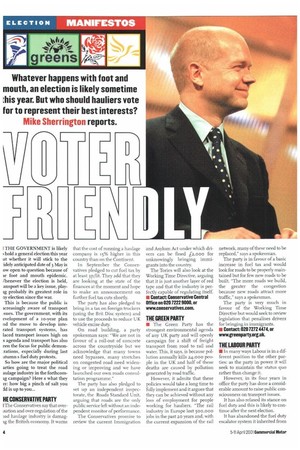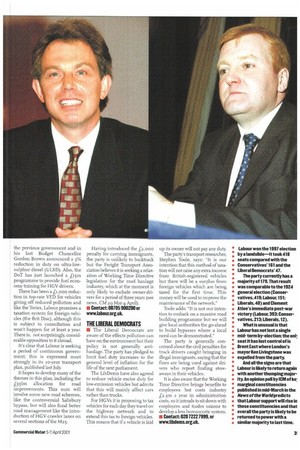Whatever happens with foot and mouth, an election is likely
Page 36

Page 37

If you've noticed an error in this article please click here to report it so we can fix it.
sometime his year. But who should hauliers vote for to represent their hest interests?
Mike Sherrington reports.
I THE GOVERNMENT is likely hold a general election this year ut whether it will stick to the idely anticipated date of 3 May is ow open to question because of ie foot and mouth epidemic. /henever the election is held, ansport will be a key issue, playig probably its greatest role in ny election since the war.
This is because the public is icreasingly aware of transport sues. The government, with its eyelopnrient of a 10-year plan rid the move to develop interated transport systems, has laced transport issues high on s agenda and transport has also een the focus for public demon:rations, especially during last aturnn s fuel duty protests.
So how are the major political arties going to treat the road aulage industry in the forthcomig campaign? Here s what they ay: how big a pinch of salt you Id is up to you...
HE CONSERVATIVE PARTY I The Conservatives say that overixation and over-regulation of the )ad haulage industry is damagig the British economy. It warns
that the cost of running a haulage company is i594, higher in this country than on the Continent, ln September the Conservatives pledged to cut fuel tax by at least 3pilit. They add that they are looking at the state of the finances at the moment and hope to make an announcement on further fuel tax cuts shortly.
The party has also pledged to bring in a tax on foreign truckers (using the Brit Disc system) and to use the proceeds to reduce UK vehicle excise duty.
On road building, a party spokesman says: "We are not in favour of a roll-out of concrete across the countryside but we acknowledge that many towns need bypasses, many stretches on congested road need widening or improving and we have launched our own roads consultation programme."
The party has also pledged to set up an independent inspectorate, the Roads Standard Unit, arguing that roads are the only public service left without an independent monitor of performance.
The Conservatives promise to review the current Immigration
and Asylum Act under which drivers can be fined f2,000 for unknowingly bringing immigrants into the country.
The Tories will also look at the Working Time Directive, arguing that it is just another layer of red tape and that the industry is perfectly capable of regulating itself.
• Contact: Conservative Central Office on 0207222 9000, or www.conservatives.com.
THE GREEN PARTY IIII The Green Party has the strongest environmental agenda of any UK party and will openly campaign for a shift of freight transport from road to rail and water. This, it says, is because pollution annually kills 24,000 people in the UK and half of these deaths are caused by pollution generated by road traffic.
However, it admits that these policies would take a long time to fully implement and it argues that they can be achieved without any loss of employment for people working for hauliers. "The rail industry in Europe lost 500,00o jobs in the past 20 years and, with the current expansion of the rail
network, many of these need to be replaced," says a spokesman.
The party is in favour of a basic increase in fuel tax and would look for roads to be properly maintained but for few new roads to be built. "The more roads we build, the greater the congestion because new roads attract more traffic," says a spokesman.
The party is very much in favour of the Working Time Directive but would seek to review legislation that penalises drivers for bringing in immigrants.
MI Contact: 020 7272 4474, or www.greenparty.org.uk.
THE LABOUR PARTY • In many ways Labour is in a different position to the other parties: as the party in power it will seek to maintain the status quo rather than change it.
However, in its four years in office the party has done a considerable amount to raise public consciousness on transport issues.
It has also relaxed its stance on fuel duty and this is likely to continue after the next election.
IL has abandoned the fuel duty escalator system it inherited from the previous government and in his last Budget Chancellor Gordon Brown announced a 3% reduction in duty on ultra-lowsulphur diesel (U LS D). Also, the DoT has just launched a i15m programme to provide fuel economy training for HGV drivers.
There has been a It000 reduction in top-rate VED for vehicles giving off reduced pollution and like the Tories, Labour promises a taxation system for foreign vehicles (the Brit Disc), although this is subject to consultation and wont happen for at least a year. There is, not surprisingly, considerable opposition to it abroad.
It's clear that Labour is seeking a period of continuous government; this is expressed most strongly in its o-year transport plan, published last July.
It hopes to develop many of the themes in this plan, including the L5 9bn allocation for road improvements. This sum will involve some new road schemes, like the controversial Salisbury bypass, but will also fund better road management like the introduction of HGV crawler lanes on several sections of the M25. Having introduced the L2,000 penalty for carrying immigrants, the party is unlikely to backtrack but the Freight Transport Association believes it is seeking a relaxation of Working Time Directive legislation for the road haulage industry, which at the moment is only likely to exclude owner-drivers for a period of three years (see news, CM 29 Mar-4 April).
• Contact: 08705 900200 or www.labourorg.uk,
THE LIBERAL DEMOCRATS • The Liberal Democrats are aware of the effects pollution can have on the environment but their policy is not generally antihaulage. The party has pledged to limit fuel duty increases to the general level of inflation for the life of the next parliament
The LibDems have also agreed to reduce vehicle excise duty for low-emission vehicles but admits that this will mainly affect cars rather than trucks.
For HGVs it is proposing to tax vehicles for each day they travel on the highway network and to extend this tax to foreign vehicles. This means that if a vehicle is laid up its owner will not pay any duty.
The party's transport researcher, Stephen Toole, says: "It is our intention that this method of taxation will not raise any extra income from British-registered vehicles but there will be a surplus from foreign vehicles which are being taxed for the first time. This money will be used to improve the maintenance of the network."
Toole adds: "It is not our intention to embark on a massive road building programme but we will give local authorities the go-ahead to build bypasses where a local need can be demonstrated."
The party is generally concerned about the civil penalties for truck drivers caught bringing in illegal immigrants, saying that the fines are being used against drivers who report finding stowaways in their vehicles.
It is also aware that the Working Time Directive brings benefits to employees but costs industry f2.3m a year in administration costs, so it intends to sit down with employers and trades unions to develop a less bureaucratic system.
• Contact: 020 7222 7999, or www.lilidems.org.uk. Labour won the 1997 election by a landslide—it took 418 seats compared with the Conservatives 161 and the Liberal Democrats' 47.
The party currently has a majority of 179. That result was comparable to the 1924 general election (Conservatives. 419: Labour, 151: Liberals. 40) and Clement Atlee's immediate post-war victory (Labour, 393; Conservatives, 213; Liberals, 12).
What is unusual is that Labour has not lost a single midterm by-election; the seat it has lost control of is Brent East where London's mayor Ken Livingstone was expelled from the party.
And all the signs are that Labour is likely to return again with another thumping majority. An opinion poll by ICM of ke: marginal constituencies published in mid-March in the News of the Work/predicts that Labour support will rise in these constituencies and that overall the party is likely to be returned to powerwith a similar majority to last time.
























































































